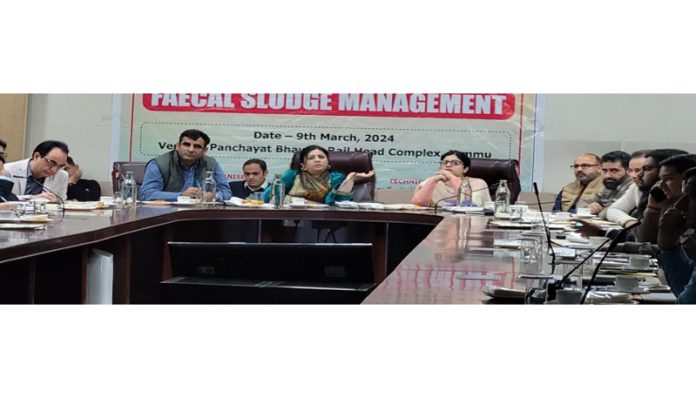Excelsior Correspondent
JAMMU, Mar 9: One-day capacity building workshop on Faecal Sludge Management (FSM) was inaugurated by Anoo Malhotra Director General Rural Sanitation, J&K in presence of Mohammad Mumtaz Ali, Director Rural Development Department, Jammu and Sanna Khan Deputy Director Rural Sanitation, Jammu.
The workshop also witnessed active participation from Assistant Commissioner Panchayats of Jammu division, Block Development Officers, engineers from different government departments and officers of Jammu Municipal Corporation (JMC).
While addressing the participants in her inaugural address, Malhotra said: “Effective Faecal Sludge Management (FSM) is pivotal in ensuring public health and environmental sustainability by promoting the safe collection, treatment, and disposal or reuse of faecal sludge.”
She further said that it was imperative for communities to adopt responsible FSM practices, especially in areas with inadequate sanitation infrastructure.
The workshop aimed to enhance the knowledge and skills of district-level officers from the Rural Development Department and bringing together key stakeholders to address the challenges and opportunities associated with FSM and reinforcing the importance of sustaining the Open Defecation Free (ODF) Plus status.
The day’s agenda comprised several informative sessions, each focusing on different aspects of Faecal Sludge Management. These interactive sessions encouraged participants to share their feedback and were characterized by their proactive engagement.
The sessions begun with the issues and challenges with respect to FSM in Rural areas, where participants actively shared their experiences and provided valuable insights. The participants gained insights into various toilet typologies and their operational mechanisms, highlighting the importance of understanding the diverse needs of communities. The interactive nature of the session facilitated lively discussions and exchange of ideas.
Trending Now
E-Paper


